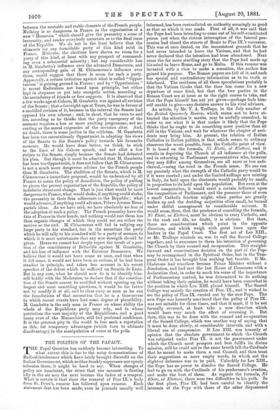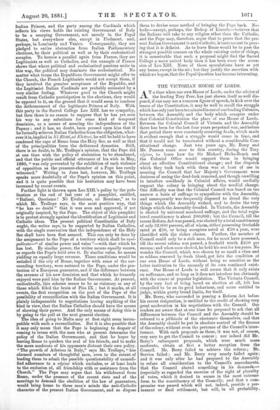THE POLITICS OF THE PAPACY.
THE Papal Question has suddenly become interesting. To what extent this is due to the noisy demonstrations of Radical intolerance which have lately brought discredit on the Italian Government, which neither frankly suppresses nor openly tolerates them, it might be hard to say. When changes of policy are imminent, the straw that one moment is floating idly in the air may the next become the index of a tempest. What is certain is that since the removal of Pius LX.'s body from St. Peter's, rumour has followed upon rumour. Each statement that has been made, even in journals usually well
informed, has been contradicted on authority seemingly as good as that on which it was made. First of all, it was said that the Pope had been intending to come out of his self-constituted prison just when the riotous interruption of the funeral pro- cession had closed the streets of Rome to Pius IX.'s successor. This was at once denied, on the inconsistent grounds that he had never intended to leave the Vatican, and that he had never declared that the intention had been abandoned. Next came the far more startling story that the Pope had made up. his mind to leave Rome, and go to Malta. If this rumour was invented with a view to make a sensation, the author has gained his purpose. The Roman papers are full of it, and each has special and contradictory information as to its truth or falsehood. The residuum of all these speculations probably is. that the Vatican thinks that the time has come for a new departure of some kind, but that the two parties in the- Roman Court are at issue as to the right course to take, and that the Pope himself has not yet given—perhaps feels him- self unable to give—any decisive answer to his rival advisers.
An article, by Mr. T. A. Trollope, in the July number of the British Quarterly Review, which seems not to have at- tracted the attention it merits, may be usefully consulted, in- order to see what it is that makes it likely that the Pope, thinks that he ought to do something more positive than sit still in the Vatican, and wait for whatever the chapter of acci- dents may bring him. At present, the relation of Italian, Catholics to Italian politics, is that which seems to ordinary- observers the worst possible, from the Catholic point-of view. It is based on the formula, Rh Eletti, ate Elettori, and it results in depriving the Church of all influence at the polls,. and in returning to Parliament representatives who, however they may differ among themselves, are all more or less anti- clerical,—using the word in the French sense. No one can say precisely what the strength of the Catholic party would be- if it were exerted ; and under the limited suffrage now existing in Italy, its hold upon the electorate would probably be small,. in proportion to its hold upon the population. But even at the- lowest computation, it would exert a certain influence upon the composition of Parliament, and the presence there of even a small Catholic fraction might, when parties are greatly broken up and the deciding majorities often small, be turned under skilful management to considerable account. It would seem, then, that the prudence of cancelling the formula, Arj Eletti, 7a Elettori, must be obvious to every Catholic, and to the rank and file, no doubt, it is obvious. But then, there are considerations which point in the opposite direction, and which weigh with great force upon the- leaders in the Papal Court. The first act of Leo XIII., as Mr. Trollope reminds us, was to call the Sacred College together, and to announce to them his intention of governing the Church by their counsel and co-operation. This straight- forward and conscientious decision on the part of the Pope may be recompensed in the Spiritual Order, but in the Tem- poral Order it has brought him nothing but trouble. If Mr. Gladstone had somehow become Prime Minister without a dissolution, and had met the last House of Commons with a declaration that, in order to mark his sense of the importance- of Parliamentary control, he was determined to do nothing without taking their opinion, he would have been somewhat in. the position in which Leo XILL placed himself. The Sacred: College was mainly the creation of Pius. IX., and it wished to. see the policy of Pius IX. carried out by the new Pope. The new Pope was honestly convinced that the policy of Pius IX. was not suitable for these times, and that it must, if it be not formally reversed, at least take a new direction which would have very much the effect of reversing it. But then, this was to be done with the counsel and co-operation of the Sacred College, which was another way of saying that it must be done slowly, at considerable intervals, and with a liberal use of compromise. If Leo XIII. was honestly or that the absolute government to which the Church was subjected under Pius IX. is not the government under which the Church most prospers and best fulfils its divine mission, still he could not in the same breath tell the Cardinals that he meant to make them a real Council, and then treat their suggestions as mere empty words, to which not the slightest deference was to be paid. Unluckily for Leo XIII, the Pope has no power to dissolve the Sacred College. He- had to go on with the Cardinals of his predecessor's creation, and make the best of them. As regards the formula, Ne Elriti, 7ie Elettori, there were two difficulties in his path. In the first place, Pius IX. had been careful to identify the interests of the Pope with those of the other dispossessed Italian Princes, and the party among the Cardinals which reflects his views holds the existing Government of Italy to be a usurping Government, not merely in the Papal States, but everywhere else, except in Piedmont, and, perhaps, in Lombardy and Venice. Consequently, they are pledged to entire abstention from Italian Parliamentary elections, by their political as well as by their ecclesiastical scruples. To borrow a parallel again from France, they are Legitimists as well as Catholics, and the example of France shows that where political and ecclesiastical passions unite in this war, the political may dominate the ecclesiastical. No matter what terms the Republican Government might offer to the Church, the French Legitimists would not. accept them, if they involved the genuine acceptance of the Republic, and the Legitimist Italian Cardinals are probably animated by a very similar feeling. Whatever good to the Church might result from Catholic participation in the elections, they would be opposed to it, on the ground that it would seem to condone the dethronement of the legitimate Princes of Italy. With this party in the Sacred College Leo XIII. has no sympathy, but then there is no reason to suppose that he has yet seen his way to any substitute for some kind of temporal dominion, as a means of assuring the independence of the Papacy ; and it has, no doubt, been pressed upon him that if he formally relieves Italian Catholics from the obligation, what- ever it is, implied in NhEletti, n Elettori, he will be held to have condoned the rape of Rome from the Holy See, as well as that of the principalities from the dethroned dynasties. Still, there is no doubt, in Mr. Trollope's opinion, that the Pope did at one time wish the policy of abstention to be abandoned, and that the public and official utterance of his wish in May, 1880, "was only prevented by the exhibition of such violence of opposition as the presence-chamber of a Pope has rarely witnessed." Writing in June last, however, Mr. Trollope speaks more doubtfully of the Pope's opinion on this point, and it is quite possible that his hesitation may have been increased by recent events.
Further light is thrown upon Leo XIII.'s policy by the pub- lication at the end of last year of a pamphlet, entitled, "Raliani Operiamo Ne Evoluzione, ne Reazione," as to which Mr. Trollope says, in the most positive way, that "he has no doubt" that it was seen and approved, if not originally inspired, by the Pope. The object of this pamphlet is to protest strongly against the identification of Legitimist and Catholic ideas. The present political Constitution of Italy ought, the writer says, to be supported by Italian Catholics, with the single reservation that the independence of the Holy See shall have been first assured. This can only be done by the assignment to the Pope of a territory which shall be equi- pollente—" of similar power and value "—with that which he has lost. By similar power, the writer means equally secure, as regards the Pope's hold over it. By similar value, he means yielding an equally large revenue. These conditions would be satisfied if the city of Rome, together with some of the sur- rounding territory, were restored to the Pope, under the pro- tection of a European guarantee, and if the difference between the revenue of his new dominion and that which he formerly enjoyed were paid him by the Italian Government. At present, undoubtedly, this scheme seems to be as visionary as any of those which filled the brain of Pius IX.; but it marks, at all events, the first recognition on the part of the Pope of the possibility of reconciliation with the Italian Government. It is plainly indispensable to negotiations having anything of the kind in view, that the Italian Catholics should have the means of showing their power. And the only means of doing this is by going to the poll at the next general election.
The idea of going to Malta may at first sight seem incom- patible with such a reconciliation. But it is also possible that it may only mean that the Pope is beginning to despair of coming to terms with the men who at present determine the policy of the Italian Government, and that he hopes by leaving Rome to quicken the zeal of his friends, and to make the more moderate of his opponents distrust their own policy. "The growth of Atheism in Italy," says Mr. Trollope, "has alarmed numbers of thoughtful men, even to the extent of leading them to admit the possible questionability of unmodi- fied adherence to a regime which excludes, or at least leads to the exclusion of, all friendship with or assistance from the Church." The Pope may argue that his withdrawal from Rome, under the pressure of the recent riots and of the meetings to demand the abolition of the law of guarantees, would bring home to these men's minds the anti-Catholic character of the present Italian Government, and so dispose
them to devise some method of bringing the Pope back. No- body—except, perhaps, the Bishop of Lincoln—believes that the Italians will take to any religion other than the Catholic, and the Pope may, therefore, argue that to prove that the pre- sent Italian Government is anti-Catholic, is tantamount to prov- ing that it is Atheist. As to leave Rome would be to pass the strongest possible censure on the whole existing order of things, it is conceivable that such a proposal might find the Sacred College a more united body than it has been since the acces- sion of Leo XIII. None of these speculations have as yet any home, except in the air; but they justify the assertion with which we began, that the Papal Question has become interesting.































 Previous page
Previous page